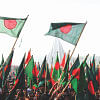The shadow lines of Bangladesh's birth

It is easy to pick one of the definitions of the word "independence" from the dictionary. It is, however, not easy to understand the struggles that our previous generations endured to gain our independence. Without a proper understanding of the past, we run the danger of taking our independence for granted.
One just needs to witness the brutality experienced by the freedom-seeking Palestinians, who are "guilty" of resisting the occupying forces in their backyard, to imagine how difficult it was for our ordinary men and women to rise against a trained professional army equipped with sophisticated weaponry in 1971. The bloodbath that ensued on the dark night of March 25, 1971, prompted resistance and resulted in our eventual victory nine months later. Bangladesh emerged as an independent country to address some of the identity issues that plagued its colonial history. On this Independence Day, as we pay homage to the people whose ultimate sacrifice made it possible for us to breathe in an independent country, we also need to engage with the politics of identity formation that sets us apart from the nations with whom we previously shared the shadow lines.
Both regional dynamics and colonial politics deeply influence the emergence of Bangladesh. The year 1947 marks one of the originary moments of this nation-state, which posed a proverbial three-body problem as its plight got caught in the gravitational forces of India and Pakistan. In the aftermath of British colonial rule, Pakistan was forged with two wings separated by a physical distance of over 1,600 km, where the shared dominant religion of Islam acted as the only national glue. That connection soon proved to be fallacious as the overlooked linguistic, ethnic, and cultural differences between the two wings led to different political and economic disparities, straining the flimsy foundational base of Pakistan.
During the colonial period, there was an attempt to divide Bengal in 1905, which was subsequently repealed in 1911. Both the partition of Bengal and its annulment managed to create enough doubts and mistrust among the local people, who began to see not only religion but also the political economy of the agrarian land as identity markers. The anxiety was further evident throughout the mass exodus of the Hindu population from the land after the creation of Pakistan. For those who remained, the oppression and injustice of Pakistani rulers made them question their newfound identity. The search for justice started when the central government in West Pakistan refused to acknowledge Bangla as one of the state languages of the country. Their attempt to impose Urdu as the only state language did not attempt to hide their desire to treat the people in eastern province as a colony. The language question proved to be symptomatic of a larger identity issue. The heavy-handed dealings of students who protested to secure the sanctity of their mother tongue punctured the fragile national unity. It was the visionary genius of Bangabandhu who understood the changing vibes and acted accordingly to define Bengali not as a religious category but as a political and cultural entity. His political career was dedicated to creating a homeland where different strands of our identity could be protected.
Historian Willem van Schendel identifies all three dates as originary moments for national identity formation. February 21, 1952—the Language Martyrs' Day—is responsible for what he calls "establishment nationalism." There is the other strand in which the Bangalee people, faced with the injustice under the Pakistani regime, imagined a secular homeland. Then there is the strand that holds an independent Bangladesh after 1971 as "the ultimate manifestation of the delta's Muslim-Bangalee identity."
Bangabandhu had to negotiate all three strands to prepare the people for their ultimate victory. His clarity of conviction was in contrast to the raging reactions of the West Pakistan leaders, who had their own problems with the military. The more autocratic the western province became, the more democratic the national consciousness of the eastern wing became.
The Pakistani rulers confined Bangabandhu to prison for nearly a quarter of his entire life. From behind bars, he realised that the entire country of Pakistan was a prison. Only the liberation of the entire country from Pakistan's oppressive rule could bring him freedom. He came up with the Six-Point Demand for provincial autonomy. The Pakistanis brought charges of sedition against him, holding him for allegedly hatching a plot known as the Agartala Conspiracy in cahoots with India. Public support for Bangabandhu made the rulers drop the charges and opt for a national election, hoping that their state machinery would be able to destroy people's will.
But the overwhelming endorsement of Mujib's demands was reflected in the election results, in which his party, the Awami League, bagged 167 out of 169 seats in the National Assembly and 288 out of 300 seats in the Provincial Assembly. The results gave Bangabandhu the legitimacy to form the government. However, the Pakistani rulers, convinced of their racial supremacy and hegemonic role, came up with an alternative plan in which they demanded power to be shared by the two majority parties in East Pakistan and West Pakistan. Bangabandhu denounced the proposal floated by Zulfikar Ali Bhutto, who became the other aspirant premier of West Pakistan. The fabricated tension allowed the military ruler, Gen Yahya Khan, to postpone the national assembly while planning to punish the Bangalee people for their defiance. He famously said, "Kill three million of them, and the rest will eat out of our hands."
The Pakistan military unleashed a three-phase genocidal campaign in 1971: "Operation Searchlight," which occurred from late March to early May; "Search and Destroy," which methodically slaughtered hundreds of thousands from May to October; and "Scorched Earth," which targeted and killed 1,000 intellectuals and professionals before the Fall of Dhaka on December 16.
Our freedom struggle helped us identify both our allies and enemies. But it also made us realise that there are no permanent friends or enemies in politics as each nation primarily pursues its self-interest. Pakistan's last-ditch attempt to prolong the war, hoping help would come from the Northern Hemisphere, made them attack India on December 3, 1971. India's intervention, overseen by the superpowers of the Cold War era, tilted the balance of power, and the efforts of our freedom fighters saw the ultimate victory purchased through their sacrifice.
Bangladesh's journey exemplifies the unwavering determination of a people to shape their destiny despite overwhelming challenges. Five decades later, as we chart our course in the turbulent waters of the 21st century, we stand as a beacon of inspiration for nations striving to break free from the shackles of history and forge their path toward a brighter future. Today, we recall the great sacrifices made by our freedom fighters and the visionary guidance of Bangabandhu Sheikh Mujibur Rahman, who dared us to dream of a homeland of our own that is free from the influences of others. It is up to the next generation not to take this freedom for granted, but to prepare it for the next league where heads can be held high without any fear.
Dr Shamsad Mortuza is professor of English at Dhaka University.
Views expressed in this article are the author's own.
Follow The Daily Star Opinion on Facebook for the latest opinions, commentaries and analyses by experts and professionals. To contribute your article or letter to The Daily Star Opinion, see our guidelines for submission.

 For all latest news, follow The Daily Star's Google News channel.
For all latest news, follow The Daily Star's Google News channel. 









Comments